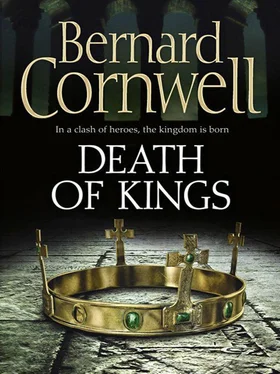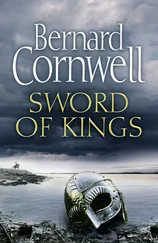‘Glory be to God!’ Edward said.
Goose feathers and tavern whores. Glory be to God.
Natangrafum became a place of pilgrimage. Hundreds of people went there, and most were disappointed because the angels did not appear every night, indeed whole weeks went by with no lights showing at the tomb and no strange singing sounding from its stony depths, but then the angels would come again and the valley beneath Natangrafum’s sepulchre would echo with the prayers of folk seeking help.
Only a few were permitted into the tomb, and those were chosen by Father Cuthbert, who led them past the armed men who protected the ancient mound. Those men were mine, led by Rypere, but the banner planted on the hill’s top, close to the tomb’s entrance, was Æthelflaed’s flag, which showed a rather ungainly goose that was somehow holding a cross in one webbed foot and a sword in the other. Æthelflaed was convinced Saint Werburgh protected her, just as the saint had once protected a wheatfield by driving out a flock of hungry geese. That was supposed to be a miracle, in which case I am a miracle worker too, but I was also too sensible to tell that to Æthelflaed. The goose banner suggested that the guards belonged to Æthelflaed, and anyone invited into the tomb would assume that it was under Æthelflaed’s protection, and that was believable because no one would credit Uhtred the Wicked with guarding a place of Christian pilgrimage. The visitor, led past the guards, would come to the tomb entrance, which, at night, was lit by dim rushlights that showed two heaps of skulls, one on each side of the low, cave-like opening. Cuthbert would kneel with them, pray with them, then command them to take off their weapons and mail. ‘No one can go into the angelic presence with war gear,’ he would say sternly and, once they had obeyed him, he offered them a potion in a silver cup. ‘Drink it all down,’ he would order them.
I never tried that liquid, which was cooked up by Ludda. My memory of Ælfadell’s drink was more than sufficient. ‘It gives them dreams, lord,’ Ludda explained when I made one of my rare visits to Turcandene. Æthelflaed had come with me and insisted on sniffing the potion. ‘Dreams?’ she asked.
‘One or two vomit as well, lady,’ Ludda said, ‘but yes, dreams.’
Not that they needed dreams for, once they had drunk, and when Cuthbert saw the vagueness in their eyes, he let them crawl into the tomb’s long passage. Inside they saw the stone walls, floor and ceiling, and on either side the chambers heaped with bones, all lit by rushlights, but ahead of them were the angels. Three angels, not two, huddled together at the passage’s end, where they were surrounded by the glorious feathers of their wings. ‘I chose three, as three is a sacred number, lord,’ Cuthbert explained, ‘an angel for each member of the Trinity.’
The goose feathers were glued to the rock. They formed fans, which, in the dim light, could easily be mistaken for wings. It had taken Ludda a whole day to place the feathers, then the three girls had to be coached in their duties, which had taken the best part of a month. They sang softly when a visitor came. Cuthbert had taught them the music, which was soft and dreamlike, not much above a hum and with no words, just sounds that echoed in that small stone space.
Mehrasa was the central angel. Her dark skin, black hair and jet eyes made her mysterious, and Ludda had added to the mystery by pasting some raven feathers among the white. All three girls were simply robed in white linen, while the dark Mehrasa had a chain of gold about her neck. Men gazed in awe, and no wonder, for the three girls were beautiful. The two Franks were both very fair-haired with wide blue eyes. They were visions in that dark tomb, though both, Ludda told me, were prone to bouts of giggling when they should have been at their most solemn.
The visitor probably never noticed the giggles. A strange voice, Ludda’s, seemed to come from the solid rock. Ludda chanted that the visitor had come before the angel of death and the two angels of life, and that they should address their questions to all three and wait for an answer.
Those questions were all important because they told us what men wanted to know, and most of that, of course, was trivial. Would they inherit from a relative? What was the prospect of the harvest? Some were heartbreaking pleas for the life of a child or a wife, some were prayers to be helped in a law suit or in a quarrel with a neighbour, and all those Ludda dealt with as best he could while the three girls crooned their soft, low and plangent melody. Then came the more interesting questions. Who would rule Mercia? Would there be war? Would the Danes come south and take the land of the Saxons? The whores, the feathers and the tomb were a net and we caught some interesting fish there. Beortsig, whose father had paid money to Sigurd, had come to the tomb and wanted to know if the Danes would take over Mercia and place a tame Mercian on the throne and then, more interesting still, Sigebriht of Cent had crawled up the dim stone passage that was pungent with the smell of burning incense, and had asked about Æthelwold’s fate.
‘And what did you tell him?’ I asked Ludda.
‘What you ordered me to tell him, lord, that all his hopes and dreams would come true.’
‘And did they come true that night?’
‘Seffa did her duty,’ Ludda said with a straight face. Seffa was one of the two Franks. Æthelflaed glanced over at the girl. Ludda, Father Cuthbert and the three angels were living in the Roman house at Turcandene. ‘I like this house,’ Father Cuthbert had greeted me, ‘I think I should live in a large house.’
‘Saint Cuthbert the Comfortable?’
‘Saint Cuthbert the Content,’ he said.
‘And Mehrasa?’
He gave her an adoring look. ‘She really is an angel, lord.’
‘She looks happy,’ I said, and so she did. I doubted she fully understood the strange things she was asked to do, but she was learning English fast and she was a clever girl. ‘I could find her a wealthy husband,’ I teased Cuthbert.
‘Lord!’ He looked hurt, then frowned. ‘If I have your permission, lord, I would take her as my wife.’
‘Is that what she wants?’
He giggled, he really giggled, then nodded. ‘Yes, lord.’
‘So she’s not as clever as she looks,’ I said sourly. ‘But she must finish here first. And if she gets pregnant I’ll seal you up with the other bones.’
The tomb was doing exactly what I had wished it to do. The questions men asked told us what was on their minds, thus Sigebriht’s anxious enquiries about Æthelwold confirmed that he had not abandoned his hopes of becoming King of Cent if Æthelwold were to topple Edward from the throne. The angel’s second task was to fight the rumours that came south from Ælfadell’s prophecies that the Danes would gain the overlordship of all Britain. Those rumours had dispirited men in both Mercia and Wessex, but now they heard a different prophecy, that the Saxons would be the victors, and that message, I knew, would encourage the Saxons, just as it would intrigue and irritate the Danes. I wanted to goad them. I wanted to defeat them.
I suppose that one day, long after I am dead, the Danes will find a leader who can unite them, and then the world will be consumed by flames and the halls of Valhalla will fill with the feasting dead, but so long as I have known, loved and fought the Danes they have been quarrelsome and divided. My present wife’s priest, an idiot, says that is because God has sown dissension among them, but I have always thought it was because the Danes are a stubborn, proud and independent people, unwilling to bend their knees to a man simply because he wears a crown. They will follow a man with a sword, but as soon as he fails they drift away to find another leader, and so their armies come together, fall apart, and then reform. I have known Danes who almost succeeded in keeping a mighty army together and leading it to complete triumph, there was Ubba, Guthrum, even Haesten, all of them tried, yet in the end they all failed. The Danes did not fight for a cause or even for a country and certainly not for a creed, but only for themselves, and when they suffered a defeat their armies vanished as men went to find another lord who might lead them to silver, women and land.
Читать дальше
Конец ознакомительного отрывка
Купить книгу












